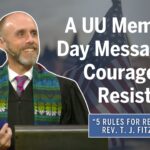Luminaries of Truth and Justice: A Dream Pursued | Rev. T. J. FitzGerald | 09.29.2024
Sermon Transcript:
The readings that we have today are by my friend Rosemary Bray McNatt. When I was in seminary, Rosemary was my teacher for Unitarian Universalist history and polity. At the time, she was the senior minister at Fourth Universalist on Central Park West in Manhattan. She’d come up every week to New Haven on the train and guide us through our studies, on the foundations of our shared faith. We were a bit of a motley crew up there in New Haven. We had one cradle UU who was on staff with the Unitarian Universalist Association; already, she’d already had a job. And she’d already edited a popular UU publication and was super low-key about it and wrote some really good stuff in it. We also had a Jesuit novice in our UU group. Well, I should say a former Jesuit novice. A Jesuit novice is someone who started formation to be a Jesuit priest in the Catholic faith, and this one fell in love with one of his fellow Jesuit people in formation.
So he found the climate of Unitarian Universalism to be a bit more welcoming and understanding of this particular fact of his life. He found the UU faith to be interesting; he was attracted to its intellectual take on theology and its overlap with ethics and philosophy. He was a big Schleiermacher nerd. I don’t know if you can be into Schleiermacher if you’re not a nerd; I don’t know if I want to meet a cool Schleiermacher fan, so. But the guy that he fell in love with and him are actually still together, which is adorable, and I often think about his sermon on the theology of the Golden Girls and giggle a little bit to myself.
We had some other students in that group who were planning to do their doctorates and wrote also wildly nerdy research papers about this faith and its history. And then there was me, the six or seven of us, and Rosemary. We did one semester of history and one of polity, which means that polity is our church structure and organization, but in the history part, we had to read the heartbreaking and painstakingly written Black Pioneers in a White Denomination. Has anyone read this book? Okay, some seminarians here. Yep.
It’s by Mark Morrison-Reed. It’s one of the most notable and accomplished pieces of history writing in the Unitarian Universalist world, and it lifts up the work of some of the most prominent members of our faith who are black. Not all of the stories are fun to hear. The first chapter in the book tells the story of Egbert Ethelred Brown, who, against tremendous odds, founded the Harlem Unitarian Church. Brown was born on the island of Jamaica in 1875; there was not a very large Unitarian population in Jamaica at the time, but Brown’s uncle let him read a sermon by William Ellery Channing that was making the rounds. And in it Brown read the statement, “The Lord our God is one God.” This awakening that started in reading this along with a lifetime of trying to understand and feel and try to embrace the Trinity he was hearing about, and after sort of a white light experience he had in a worship service while saying this creed, he did not believe it led Brown to a choice in his life.
He knew he wanted to be a minister. He felt that call, but would he enter the ministry of the Unitarian Church, a very white denomination, or be a minister in the African Methodist Episcopal Church, which was the most respected and influential black church in the United States and growing throughout the world? As Brown tells it, he applied to the ministry of AME Church and also wrote to the UU, or the American Unitarian Association, which forwarded his inquiry to the seminary in Chicago, the Meadville School. And on the same day, the same set of mail replies accepting him to both ministries arrived at his front door. He says it was the same day he was a great preacher, so maybe it was the same day, maybe it wasn’t, but it works. It works. And he chose to become a Unitarian minister, which meant he’d have to leave and travel to Chicago for school. The ministry he began in 1900. He has a very convenient life; born in 1875, 1900, as you’ll see, when he received this letter, it would continue for more than half a century.
And it was never easy, not once. Just getting to seminary in Chicago took 10 years. He suffered job losses, deportations from the United States, deceptions and ruses by his own dad, calculated to try to force him to stay on island. Then accusations of theft against him when that didn’t work, which affected his immigration status, it goes on. But after a decade of endurance, on his third trip to the United States, Brown entered Seminary in Chicago, and those were some of the best years of his life, meeting people who were finally speaking the language of faith that he had been feeling, that he had been moving toward at last. Many of us have had that experience here, and Brown began his ministry in the place he felt called to be Montego Bay population in 1912, 7,000. And also his hometown, where he was shunned already, remember for proclaiming his Unitarian beliefs and where he had already been accused of theft in the past. And after a taste of being a prophet in his own land, it did not go that well.
He moved to a larger community in Kingston, and just as he did, the American Unitarian Association pulled all funding for the mission to Jamaica. And as a consolation, they sent him $100. Yeah, but Ethelred wasn’t going to give up; he talked to his wife; they talked about the $100 and rather than use it to “bridge the time when he could find other employment,” as the letter written by his Boston colleagues said, with the heavy hand of paternalism, which suggested he do that. Brown instead traveled to Boston to meet with them, to have a conversation, and he found something out that shocked him in that meeting. His words, “I was surprised, disappointed, disillusioned as I faced a standard of judgment which declared that the failure or success of a religious venture was based on the number of members enrolled and the amount of dollars collected. Such intangible considerations as the emancipating power of our message and the evidence on all hands of the effects of its leavening influence weighted not at all. For the first time in my life, my faith trembled in the balance.”
The writer, Morrison-Reed, surmised, and pardon me for my bluntness, but we speak truth. That the denomination leadership did not believe that the people of Jamaica or any other black people had the intellectual capacity to grasp Unitarian thought and faith. And this racist attitude undermined virtually all of Brown’s ministries in his life, including his next chapter. 10 years after starting his ministry in Jamaica, Brown moved to what had become one of the world’s centers of culture and black prosperity, Harlem, New York. It was 1920, and Brown arrived in Harlem. It was the height of the Harlem Renaissance. And yet Brown’s experience in Harlem over the next nearly four decades is a deeply American story.
One where, despite all of Brown’s tireless work and sacrifice, so little aid, support, and fellowship was offered by the denomination. That his ministry was not able to flourish amid one of the most exciting and vibrant times for new thought and experimentation in the history of New York and possibly the world. Members and ministers though of the local churches, local colleagues there in Manhattan did support him, supported his family and his ministry. And Brown made lifelong friends with the colleagues there. But the American Unitarian Association did little or nothing to help this lifelong, this fledgling enterprise. Morrison-Reed points out too that Brown didn’t do really much of the work he needed to discern if such an enterprise was even wise. He just sort of started it up in Harlem. And in response, many in the AUA at the time pointed to Brown’s race again as the problem. And named in him an inherent inferiority that could not be helped.
This story about Brown of this perception was fed by reports of his impoverishment and the struggles of his family members, including a son who actually ended his own life and who Brown discovered himself, another who was committed to a mental hospital, and a wife who struggled mightily with her own mental health. These are real problems, this deeply American story, because these outcomes were seen by those in power, by those with the power to prevent much of this suffering by supporting this ministry as a sign of his unfitness for the work. And in the end, the AUA granted Brown a pension in his 60s, but he didn’t retire. He finally had enough money in the pension to continue doing the work he was called to do. And that was when his ministry actually started to grow and thrive. Go figure.
It is a deeply American story I know to talk about equity and to observe then, from a safe distance, why those seeking to bring about equity fail for lack of support in their work and then are made as an example of why equity will not work. Anyone ever see that playing out here in the country? We see this now. We see this still. Initiatives and workplaces to increase equity are being rolled back and how, and some are being outlawed by those with the power to do it who don’t like how they make them feel, or they’re being halted by activist plaintiffs with the complicity of willing judges who claim dispassion and logical reasoning but are really practicing indifference.
Indifference in any part of a system can infect the whole system, will infect the whole system. And indifference to suffering and death can infect any system and harm it from the inside out, and Reverend Rosemary tells us that church is not a place to hide. Today, Reverend Rosemary is the President of Starr King School for the ministry, one of our Unitarian Universalist Seminaries. She used to come and preach for us. She came twice while I was serving in Hawaii and living there. It’s a little easier to get my friends to visit my pulpit when it was in Hawaii.
And she said that even today, her fear of being seen as an angry black woman when she’s preaching makes her quell that rage that is so plain for those who face inequity or those who observe inequity even. And especially for those who raise black sons in this country and love a black husband and wonder and start to panic when they are coming home late. I know this is hard to hear, it’s hard to talk about, but it’s hard to start a discussion of equity when this active harm and fear is at work in the minds of people we love. Right? And active fear and harm are not far from many right now. Lethal aggression and unchecked indifference to the lives of non-combatants is becoming the norm, if not the point of campaigns bent on destruction of what looks like entire ways of life, entire groups of people.
And this week we saw on one person, two, in the case of Marcellus Williams this week. The family of the victim in Williams case and the prosecutor on that case reached an agreement to take the death penalty off the table in light of questions, real questions about the evidence. Then the Missouri court rejected the deal, indifference. The governor of Missouri took no action, indifference. And the US Supreme Court allowed the execution to go forward, indifference. In spite of the state-sanctioned killing, he’d soon receive Marcellus, in his last words, praised, and I quote, “Allah in every situation.” His actual last words. Marcellus’ Imam Jalahii Kacem sat next to him in the execution chamber and listened to his last words. Kacem spoke to Marcellus as his chest heaved, and he stayed with Marcellus till he breathed no more.
This church has never been a place to hide. It’s a sanctuary. Yes, it’s a retreat in some ways, but not a place to hide. It’s a place of encouraging and loving difference for a reason, because we need a place with difference to fight against indifference, right? Rosemary mentioned some great authors and activists in her reading, people who are praised still for being visionary, for seeing part of the future to come. People say of them, “Their words are just as true today as when they were written.” Yes, this speaks to their vision. Yes, this speaks to their genius, and yes, to their hope of a faith in a future of progress. But the ring of their truth and what it is pronounced that it remains true speaks more loudly to indifference than to their call or their genius friends. Because if something someone said in the 20s and the 60s still needs to be said today is still true today, that is a problem. The problem is a system resistant to change, to growth, and to progress.
A system perhaps that is so sick it can’t grow, or worse, is indifference to the need to grow. In his book, Morrison-Reed asks a question: “Is this a faith that concerns itself with creating freedom, or is it a faith for those who are already free from economic and societal oppression?”
Ethelred Brown brought his faith. Brought his faith to one of the great centers and moments of world culture, and his faith met every obstacle to the end. It did not fail. It did not fail, no matter what we hear. Here I am, here you are, holding the candle of a brave, undauntable soul who knew what freedom meant and found what freedom cost. He would not cease in his quest to set the table for all and to welcome all to this faith’s nourishing love. We’re going to sing the hymn, the Welcome Table, in a little bit, but before we do hear this, there are countless versions of that hymn, countless verses that tell us, sung over the years, that all of them hold the power and the promise of true equal places at the table, not only in the next life, but in this one too.
At times. At times, this pain of injustice, I know and I feel it, friends; it’s enormous, and its growing heft weighs heavily on us, and I have wondered at times if it would crush me, myself, but for decades now. At turns, when I thought it was over, when the well of pain’s gravity was going to tear me up, I held on. I held on to a faith taught to me by Rosemary, who pastored a church two miles from where Brown pastored his and who now helps to shape the minds and the hearts of pastors to come. The shift in her words between decades also gives me hope; those two readings are 25 years apart, from the tremendous undertaking we have before us at first to the joy we have discovered comes when we do it. This radical faith will not be satisfied with salvation in another time.
This radical faith insists on justice in this time and bears the powerful witness of its forebears like Brown, who light still the way for all to come. Egbert Ethelred Brown was a radical friend. The purity of his passion for ministering to others, for leading a church of what he called, in his words, “the faith of the future,” speaks to us now and forever, because to the extent we dismantle racist systems is the extent to which we all will be free. To the extent we cease indifference to suffering is the extent to which we can finally love in fullness, and to the precise extent that we bring this living faith into the lives of others is the precise extent to which we may welcome all fully at last.
And bring God, bring love, bring welcome, bring the great mystery, or even bring Allah at last into every situation, so that those might no longer be the last words on the subject, but perhaps will be the first words of someone finding this faith. Let us work together to ensure our difference. It will guard us, our hearts, and all who seek justice in this world from the illness of indifference in our times. And in this way, we might better love one another and, at last, please love the world. May it ever be so blessed be, and amen.








